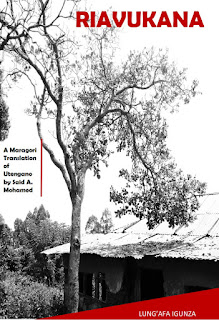Maragori translation of Utengano by Said A. Mohamed
The book captivatingly starts, 'Koveye na mingi agasinya Kazija.
'Do do, gamusinyaa. Kutanga, yasinywa nu mundu Musaza. Yamusinya kijira kivuni, nacho ni kuva yavikwa imbiri, kari niva Kazija si amanyi na vwaha. Kazozo aramwisuha mundu Musaza ku rwa yago.'
Kiswahili is a rich language. Listening, talking, reading and writing all require a good attention. Its depth of sarcasm, flat replies in direct speeches, obtuse similes and farfetched adjectives makes the language worth studying and finding pleasure in. Not mentioning the forth-back and back-forth jerks in tells of suspense. Sometimes in successive words, sometimes in a sentence and often in paragraphs. Kiswahili does not only serve the purpose of communication but also entertainment of the mind with its word intrigues. It is therefore a recommendable exercise to Kiswahili authors who have published genius masterpieces and in that way advanced and spread Kiswahili, a future African philosophy media.
Coming to translate Utengano, I had studied the book in high school and it was interesting by the guidance of our teacher, Mr. Kamudenyi. Severally after school I read it among others. And each time was a new, with different perceptions. I have even strongly blogged that the book was too mature for a high scholar. True, real education happens after school.
Well done by Said A. Mohamed, I have reflected on the stories, compared some plots to my life and others to the stories gotten from my community organizing practice. I have even tried to mix-match characters in Utengano with those in other books, all in sweet speculation of life stages, choices and fate.
This translation is therefore out of passion than anything else. There are books you read and never leave you the same. A reader is required to be malleable in thought, not so rigid with one's beliefs and style of action, not so stupid again to cry all through a moving story or even develop depression, but to grow wings out of the knowledge. Not for any gain whatsoever that I would have decided to translate for personal rereads but in consideration of those who would equally appreciate a translated version, this work is freely and confidentially shared.
Two, passionate to the goal of Saniaga CBO in advocating for Indigenous Knowledge that can be well packaged in stories, I take to offer my extra time in such activities. Through that, I hope, I shall have done justice to my mother-tongue. And experienced such pleasure in learning more, something I would have not gotten privilege to elsewhere.
- Lung'afa.

thanks
ReplyDelete